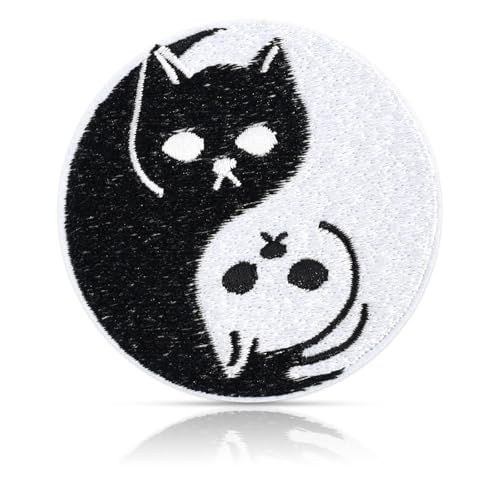Why do black kittens appear to change color?
If you’re a cat lover like me, you may have noticed something quite fascinating about black kittens – their fur seems to change color as they grow older. But why does this happen? Let’s explore some possible reasons behind this enchanting transformation.
**1. **Genetic Factors: Just like humans, cats have genes that determine their appearance. The specific genes responsible for coat color are called melanocyte-stimulating hormone receptor (MC1R). In black kittens, these genes produce a pigment called eumelanin, which gives their fur its dark hue. As the kittens mature, these genes may become less active, causing a shift in their coat color. It doesn’t mean their fur actually changes color, but rather that the eumelanin becomes less dominant, revealing other pigments that were already present.
**2. **Sunlight Exposure: Another factor that may contribute to the perceived color change is sunlight. Sun exposure can affect the appearance of fur, especially in cats with black coats. The sun’s rays can lighten the fur’s pigment, creating an illusion of color alteration. So, if your black kitten spends a lot of time basking in the sunlight, it’s possible their fur may appear different due to the sun’s effects.
**3. **Texture and Lighting: The way light interacts with a black cat’s fur can also play tricks on our eyes. The texture of a cat’s coat, along with the ambient lighting, can create variations in how we perceive their color. For example, if a black kitten has a glossy, smooth coat, it may reflect light differently, making their fur appear to have different shades.
**4. **Maturation Process: As black kittens mature, their fur may undergo a natural process of evolution. This is especially noticeable during their adolescence. During this time, their coat may become denser or lighter, giving the impression of a color change.
The appearance of black kittens changing color can be attributed to a combination of genetic factors, sunlight exposure, texture and lighting, and the natural maturation process. But remember, this transformation is merely an illusion caused by these factors and not a true change in their fur’s color. How intriguing it is to witness these beautiful creatures as they grow and flourish, always captivating us with their enchanting charm.
The role of genetics in color change
Genetics plays a vital role in determining the color of a black kitten’s fur. These little feline creatures are born with a specific set of genes that dictate their initial coat color. Some kittens are genetically predisposed to have a solid black coat from birth.
As the kittens grow older, their genes interact with other factors, such as sunlight exposure and the natural maturation process, ultimately leading to the appearance of a color change. However, it’s important to note that this change is not an actual alteration in the fur’s pigment, but rather an illusion created by external factors.
Genes control various aspects of a cat’s appearance, including their fur color. Different genes express themselves differently and can interact with one another. This interaction can result in a range of coat colors, patterns, and even textures. In the case of black kittens, their genes can interact with the amount of sunlight they receive, creating the illusion of a color change.
Additionally, it’s worth mentioning that not all black kittens will go through this apparent color transformation. Some may retain their solid black coat throughout their lives due to the specific combination of genes they inherit. Others may experience subtle shifts in shade or texture, but their overall color remains consistent.
Understanding the role of genetics in color change helps us appreciate the intricate beauty of black kittens. It also reminds us that their uniqueness is a result of the complex interplay between their genetic makeup and external factors.
So next time you spot a black kitten seemingly changing color, remember to marvel at the wonders of genetics at work. It’s an incredible process that adds to the charm and allure of these adorable feline creatures.
The impact of lighting and environment
As a cat lover, you may have noticed that your black kittens sometimes appear to change color. This fascinating phenomenon can be attributed to a combination of lighting and environmental factors.
Sunlight plays a significant role in how a black kitten’s coat appears. When your little furball is exposed to sunlight, the rays can interact with the fur’s pigmentation and create the illusion of a color change. This is often referred to as “sun bleaching.” The intensity and duration of sunlight exposure can influence the extent to which the coat appears lighter or reddish-brown in certain areas.
Indoor lighting also has an impact on your black kitten’s perceived color. Different types of lighting, such as fluorescent or incandescent bulbs, can alter the way the fur appears. This is due to variations in the light’s color temperature, which can create different visual effects and make the coat look lighter or darker.
Another factor to consider is the reflective properties of the environment your black kitten is in. Surfaces like mirrors, shiny floors, or even the color of the walls can reflect light and create a play of colors on your kitten’s coat. This can make it seem like their fur has changed color when, in reality, it’s just an optical illusion.
It’s important to note that not all black kittens will go through this apparent color transformation. Some may retain their solid black coat throughout their lives, unaffected by the changing lighting conditions and environment. Nonetheless, understanding the impact of lighting and environmental factors on color perception helps us appreciate the beauty and uniqueness of black kittens even more.
So the next time your little feline friend seems to change color before your eyes, remember the fascinating interplay between genetics, sunlight, indoor lighting, and the environment. It’s a reminder of how wonderfully intricate and diverse the world of cats can be.
Other factors affecting the appearance of black kittens
When it comes to the appearance of black kittens, there are other factors besides lighting and environmental influences that can play a role. These additional factors contribute to the unique and ever-changing appearance of these adorable felines. Let’s explore them:
Genetics: One of the most significant factors in a black kitten’s appearance is genetics. Just like humans, cats inherit certain traits from their parents, including fur color. The genes responsible for determining fur color can vary, leading to a range of shades and patterns within the black cat population. These genetic variations can result in subtle differences in a black kitten’s appearance.
Age: As black kittens grow and develop, their fur can undergo changes in color and texture. This is particularly noticeable during the transition from kittenhood to adulthood. The fur may become softer, denser, or even take on a slight sheen as the kitten matures. These changes in fur quality can affect how the black coat appears to the human eye.
Health: The overall health of a black kitten can also impact its appearance. A well-nourished and healthy kitten tends to have a shiny, lustrous coat. On the other hand, a kitten with poor nutrition or underlying health issues may have a duller, less vibrant coat. So, ensuring your black kitten’s well-being through proper nutrition and regular veterinary check-ups can contribute to the maintenance of its beautiful appearance.
Grooming: Regular grooming plays a vital role in enhancing the appearance of black kittens. Brushing your kitten’s fur not only helps remove loose hair and prevent matting but also spreads natural oils throughout the coat, giving it a healthy shine. Additionally, grooming can help you notice any unusual changes in your black kitten’s fur, such as color variations or signs of skin problems that may require veterinary attention.
Seasonal Changes: It’s important to note that black kittens’ appearance can also be influenced by seasonal changes. Just like humans, cats can experience variations in fur color and thickness depending on the time of year. For example, some black kittens may develop lighter fur during the warmer months to help regulate body temperature. These seasonal changes can further contribute to the illusion of color transformation.
The truth behind the color-changing myth
Have you ever heard the myth about black kittens changing color? You may have come across stories claiming that black kittens can transform into different colors as they grow. But is there any truth to this fascinating idea? Let’s dive into the facts and explore the reality behind this myth.
It’s simply an illusion: The truth is, black kittens don’t actually change their color. The perception of color change may arise due to a combination of factors, including lighting conditions, environmental influences, and the kitten’s own unique characteristics.
Lighting magic: Lighting plays a significant role in how a black kitten’s fur appears. Different lighting conditions can create the illusion of color variations. For example, in brightly lit areas, the black fur may appear to have a brownish hue, while in dimmer lighting, it may seem more intense and pure black.
Environmental factors: Your black kitten’s surroundings can also influence its perceived color. For instance, if your furry friend spends a lot of time outdoors, exposure to sunlight can lighten the fur over time. On the other hand, spending more time in darker environments can give the illusion of a darker coat.
Genetics at play: The genetic makeup of a black kitten can contribute to its appearance. Some black kittens may have genetic variations that result in slight variations in their coat color, such as a reddish tint or gray highlights. However, these changes are usually very subtle and don’t involve a complete transformation into a different color.
Purrfectly normal changes: Just like any other kitten, black kittens also experience changes in their appearance as they grow. These changes might include shifts in fur texture, length, and even pattern. But it’s important to note that these alterations happen gradually over time and do not involve a radical and sudden change in color.
Embrace the uniqueness: The enchantment of black kittens lies in their ever-changing appearance. Each black kitten has its own individual characteristics that make them special and unique. So, instead of expecting a dramatic color change, celebrate the beauty and diversity of black kittens as they grow and thrive.
Now that you know the truth behind the color-changing myth, you can appreciate the magic of black kittens even more. Their captivating appearance, influenced by lighting, environment, genetics, and growth, makes them truly extraordinary. Embrace their uniqueness and enjoy the journey of watching them grow into beautiful adult cats.
Conclusion
Now you know the truth about black kittens and their supposed color-changing abilities. It turns out that they don’t actually change color at all. The perception of color change may be influenced by various factors such as lighting, environment, and the kitten’s own characteristics.
While genetics can contribute to slight variations in coat color, these changes are usually subtle and not as dramatic as some may believe. The changes in appearance that black kittens experience as they grow are completely normal and gradual.
It’s important to celebrate the beauty and uniqueness of black kittens, regardless of any perceived color changes. Their sleek and shiny black coats are truly stunning, and they deserve all the love and attention they can get.
So, the next time you come across a black kitten, remember that they are just as beautiful as any other kitten, and their coat color is simply part of their natural charm. Embrace their uniqueness and enjoy the joy they bring into your life.
Frequently Asked Questions
Q: Do black kittens really change color?
A: No, black kittens don’t actually change their color. The perception of color change may arise due to factors such as lighting conditions, environmental influences, and the kitten’s own unique characteristics.
Q: Can genetics affect the coat color of black kittens?
A: Genetics can contribute to slight variations in coat color, but these changes are usually subtle. The changes in appearance that black kittens experience as they grow are normal and gradual.
Q: What factors can influence the perception of color change in black kittens?
A: Factors such as lighting conditions, environmental influences, and the kitten’s own unique characteristics can influence the perception of color change in black kittens.
Q: Are the changes in appearance normal for black kittens?
A: Yes, the changes in appearance that black kittens experience as they grow are normal and gradual. It is a natural part of their development.
Q: Why do black kittens have unique characteristics?
A: Black kittens, like all cats, have their own unique characteristics due to factors such as genetics and individual traits. These unique characteristics contribute to their overall appearance and personality.
Q: What should we appreciate about black kittens?
A: We should appreciate the beauty and uniqueness of black kittens. Their rich black fur and distinct features make them special and deserving of love and attention.
















